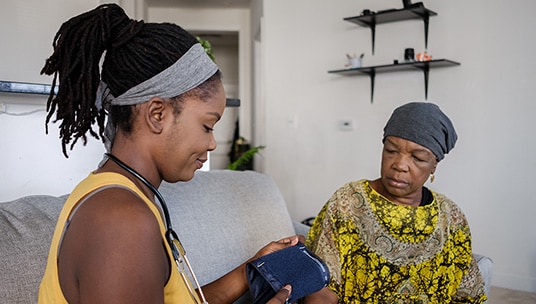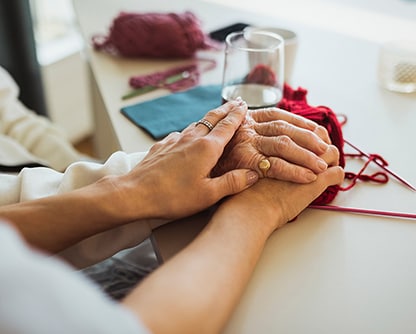Wellness
Social distancing & depression: How to find support through coronavirus (COVID-19) isolation
Written by Emily Ornberg, Clinically reviewed by Amy Magill, MA, RDN and Jen Matz, MPH Dec 19, 2022 • 7 min
As coronavirus (COVID-19) spreads, more people across the globe are urged to stay home, keep a safe distance of about six feet from people and avoid gathering in groups.
This "social distancing" is essential to slow the spread of COVID-19.1,2 But beyond the stressors of a changing work, school or childcare situation and events and plans being canceled, being away from others and alone with your thoughts can take a toll on your mental health.2
Imagine your mental wellbeing as a bucket, and as more stressors get added, the harder it is to maintain or carry.3 We all carry around our own stressors such as working a difficult job, managing health conditions or caring for children. Depression and anxiety can take up a lot of space in that bucket—add the fear of exposure to COVID-19, isolation from others and lack of access to common coping mechanisms like exercising at the gym or doing other meaningful activities, and it can spill over. Finding other ways to cope and connect with others can help lighten your load.
How can social distancing from the COVID-19 outbreak trigger depression?
Connecting with other people helps us feel emotionally supported and can play a major role in our happiness levels. So isolation can be dangerous for people's mental health—especially those who already have depression or anxiety.2 Between the stressors of facing a hiatus from meaningful activities and social engagement; financial strain from being unable to work; and a lack of access to typical coping strategies such as going to the gym or attending religious services, it's understandable to feel heavy mental impacts such as fear, anxiety, depression or anger during this period.2 Common reactions to quarantine could include anxiety about yourself or your family's health; frustration over the loss of agency or personal freedom; depression as a result of the disruption from your life; or stigmatized if you are sick or have been exposed to COVID-19.2
Studies show that social isolation can not only contribute to mental illness, it can wreak havoc on your physical and cognitive health.4 Some studies suggest social isolation can lead to adverse health consequences ranging from depression, poor sleep quality, cognitive decline and poor cardiovascular function.4 And long-term feelings of loneliness can lead to premature death.4
It isn't known if a period of a few weeks in isolation leads to such significant physical implications. However, older adults, people with pre-existing mental health conditions and healthcare workers responding to the outbreak may have an increased risk of distress from social distancing, quarantine or isolation.2
How can I help prevent feelings of loneliness during social distancing?
An effective way to combat feelings of isolation can be as easy as reaching for your cell phone. Dozens of studies have shown that people who have regular social interactions with family, friends and their community are happier, have fewer health problems and live longer.5 Connecting with others can also help reduce harmful levels of stress, which can have a positive effect on your health and immune system.
5 ways to stay connected during social distancing
1. Call someone.
Whomever you call will likely appreciate hearing from you as much as you'll enjoy talking with them.
2. Schedule video chats.
Have dinner with someone new every night or schedule a virtual dinner party with the whole family!
3. Send quick messages.
Text your friends and family throughout the day to catch up and offer support.
4. Write letters to express gratitude.
Expressing your thankfulness can help you feel more positive and cope with adversity.6
5. Join online groups.
Find message boards centered around some of your favorite likes or hobbies, such as sports, reading or gardening, can help you feel a part of a community.7
What are other ways to help cope during the COVID-19 outbreak?
Planning ahead with how you and your family can cope with the stressors of social-distancing can help you stay prepared and in control.2
5 ways to help prevent stress surrounding the outbreak of COVID-19
1. Create and follow a daily routine.
Regular daily activities can help both adults and children preserve a sense of purpose in a time of uncertainty. Try to schedule time for work, school, exercise and hobbies.
2. Take breaks from the news, including social media.
Constant information about the pandemic can be overwhelming and upsetting.
3. Make time to unwind.
Read books, do crafts or other hobbies you enjoy. Make a to-do list of dream projects you've never had time for.
4. Maintain healthy habits.
Take deep breaths, exercise regularly, eat healthy meals and get plenty of sleep. Do not turn to alcohol, tobacco or drugs to cope with the stress of the situation.
5. Reach out to professionals.
If you, or someone you care about, is feeling overwhelmed with emotions, contact a health care provider for a virtual therapy consultation or call SAMHSA's National Helpline, 1-800-662-HELP (4357)
Pay attention to how you and your loved ones are feeling each day, share your feelings, offer support to those who may need it and don't hesitate to reach out to your health care provider. If you already have a mental health condition, continue to follow your treatment plan as directed by your provider, including taking medications as prescribed. Small efforts to lighten your load every day may help lower the potentially harmful effects of isolation.
Sources:
1. https://www.cdc.gov/coronavirus/2019-ncov/prepare/prevention.html
2. https://www.apa.org/practice/programs/dmhi/research-information/social-distancing
3. https://mentalhealth-uk.org/blog/the-stress-bucket/
4. https://www.apa.org/monitor/2019/05/ce-corner-isolation
5. https://www.health.harvard.edu/newsletter_article/the-health-benefits-of-strong-relationships
6. https://www.health.harvard.edu/healthbeat/giving-thanks-can-make-you-happier


